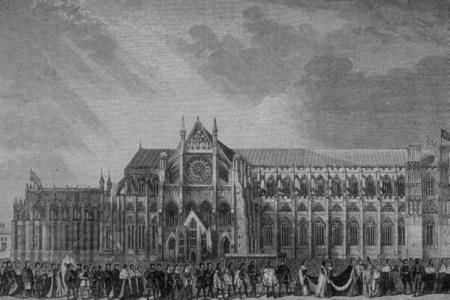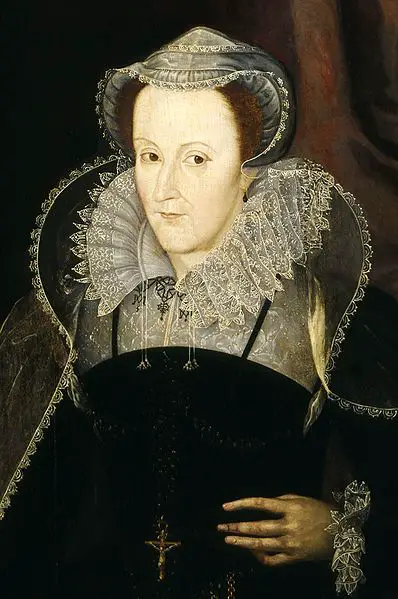On 20 February 1547, King Edward VI was crowned King at Westminster Abbey. Here are some primary sources regarding his coronation.
From The Chronicle of the Grey Friars:
Item the xx. day of the same monyth the sayd kynge Edwarde the sixth came from the tower of London thorrow London, and in dyvers places pagenttes, and alle the strettes hangyd reghely, (fn. 1) wyth alle the crafftes stondynge in Chepe, presentynge them as lovynge subjecttes unto their kynge, and soo to Powlles; and at the west ende of Powlles stepull was tayed a cabelle roppe, and the other ende besyde the denes place at an hanker of a sheppe, (fn. 2) and a man ronnynge downe on the sayd roppe as swefte as an arrow owte of a bowe downe wyth hys honddes and fette abrode not tochynge the roppe; and whane the kynge had sene the sayd thynge went forth un to the pallys of Westmyster; and the nexte day came from thens unto Westmyster churche, and there was crownyd, and kepte hys fest in Westmyster halle. God of hys mercy sende hym good locke and longe lyffe, with prosperite! And this was done in the ix. yere of hys age and byrth.
From chronicler and Windsor Herald Charles Wriothesley:
The nynetenth daie of Februarie the Kinges Majestie rode from the Towre to Westminster through the cittie of London, which was rychly hanged with riche cloathes and divers pageantes, the conduites running wyne, the craftes standing in their raills, and the aldermen, the lord major riding in a crymosin velvett gowne with a rych collar of goulde, with a mase in his hand, afore the King; and, when his Majestie came where the aldermen stode, the Recorder made a proposition to his Majestie, and after the Chamberlaine gave his Majestie a purse of cloath of gould for a present from the cittie, which he thanckfullie tooke.
This month of Februarie was levied amongest the citizens of London for the Kinges coronation a benevolence after the manner of a xvth and a half.
The twentith daie of Februarie, being the Soundaie Quinquagesima, the Kinges Majestie Edward the Sixth, of the age of nyne yeares and three monthes, was crowned King of this realme of Englande, France, and Irelande, within the church of Westminster, with great honor and solemnitie, and a great feast keept that daie in Westminster Hall which was rychlie hanged, his Majestie sitting all dynner with his crowne on his head; and, after the second course served, Sir Edward Dymmocke, knight, came ridinge into the hall in clene white complete harneis, rychlie gilded, and his horse rychlie trapped, and cast his gauntlett to wage battell against all men that wold not take him for right King of this realme, and then the King dranke to him and gave him a cupp of golde; and after dynner the King made many knightes, and then he changed his apparell, and so rode from thence to Westminster Place.
The 21st daie was great justes with runninge at the tilt, and the Justes. 22th daie was fighting and turninge at the barriors, where was many noble feates donne.
Archbishop Thomas Cranmer's speech at Edward VI's coronation:
MOST dread and royal sovereign: The promises your highness hath made here at your coronation, to forsake the devil and all his works, are not to be taken in the bishop of Rome's sense, when you commit any thing distasteful to that see, to hit your majesty in the teeth; as pope Paul the third, late bishop of Rome, sent to your royal father, saying, "Didst thou not promise, at our permission of thy coronation, to forsake the devil and all his works, and dost thou turn to heresy? For the breach of this thy promise, knowest thou not, that tis in our power to dispose of the sword and sceptre to whom we please?" We, your majesty s clergy, do humbly conceive, that this promise reacheth not at your highness sword, spiritual or temporal, or in the least at your highness swaying the sceptre of this your dominion, as you and your predecessors have had them from God. Neither could your ancestors lawfully resign up their crowns to the bishop of Rome or to his legates, according to their ancient oaths then taken upon that ceremony.
The bishops of Canterbury for the most part have crowned your predecessors, and anointed them kings of this land: yet it was not in their power to receive or reject them, neither did it give them authority to prescribe them conditions to take or to leave their crowns; although the bishops of Rome would encroach upon your predecessors by his bishops act and oil, that in the end they might possess those bishops with an interest to dispose of their crowns at their pleasure. But the wiser sort will look to their claws and clip them.
The solemn rites of coronation have their ends and utility, yet neither direct force or necessity: they be good admonitions to put kings in mind of their duty to God, but no increasement of their dignity. For they be God's anointed, not in respect of the oil which the bishop useth, but in consideration of their power which is ordained, of the sword which is authorised, of their persons which are elected by God, and endued with the gifts of his Spirit for the better ruling and guiding of his people. The oil, if added, is but a ceremony; if it be wanting, that king is yet a perfect monarch notwithstanding, and God's anointed, as well as if he was inoiled. Now for the person or bishop that doth anoint a king, it is proper to be done by the chiefest; but if they cannot, or will not, any bishop may perform this ceremony.
To condition with monarchs upon these ceremonies, the bishop of Rome (or other bishops owning his supremacy) hath no authority, but he may faithfully declare what God requires at the hands of kings and rulers; that is, religion and virtue. There fore not from the bishop of Rome, but as a messenger from my Saviour Jesus Christ, I shall most humbly admonish your royal majesty, what things your highness is to perform.
Your majesty is God's vice-gerent and Christ's vicar within your own dominions, and to see, with your predecessor Josiah, God truly worshipped, and idolatry destroyed, the tyranny of the bishops of Rome banished from your subjects, and images removed. These acts be signs of a second Josiah, who reformed the church of God in his days. You are to reward virtue, to revenge sin, to justify the innocent, to relieve the poor, to procure peace, to repress violence, and to execute justice throughout your realms. For precedents, on those kings who performed not these things, the old law shews how the Lord revenged his quarrel; and on those kings who fulfilled these things, he poured forth his blessings in abundance. For example, it is written of Josiah in the book of the Kings thus: " Like unto him there was no king before him that turned to the Lord with all his heart, according to all the law of Moses, neither after him arose there any like him." This was to that prince a perpetual fame of dignity, to remain to the end of days.
Being bound by my function to lay these things before your royal highness, the one as a reward, if you fulfil; the other as a judgment from God, if you neglect them; yet I openly declare before the living God, and before these nobles of the land, that I have no commission to denounce your majesty deprived, if your highness miss in part, or in whole, of these performances, much less to draw up indentures between God and your majesty, or to say you forfeit your crown with a clause, for the bishop of Rome, as have been done by your majesty's predecessors, king John, and his son Henry of this land. The Almighty God of his mercy let the light of his countenance shine upon your majesty, grant you a prosperous and happy reign, defend you and save you; and let your subjects say, Amen!
God save the king.
There is also a detailed description of Edward VI's coronation in John Strype's Memorials of the Most Reverend Father in God, Thomas Cranmer, sometime Lord Archbishop of Canterbury... (Volume 2) - see https://archive.org/stream/memorialsofmostr02stry#page/n29/mode/2up.
See Edward VI - Primary Sources for more primary sources on Edward and his reign.
See http://www.britishmuseum.org/explore/highlights/highlight_objects/cm/e/edward_vi_coronation_medal.aspx for a photograph of and information on Edward VI's coronation medal.
Notes and Sources
- 'The Chronicle of the Grey Friars: Edward VI', in Chronicle of the Grey Friars of London Camden Society Old Series, Volume 53, ed. J G Nichols (London, 1852), pp. 53-78 - read online at http://www.british-history.ac.uk/camden-record-soc/vol53/pp53-78
- A Chronicle of England During the Reigns of the Tudors from AD 1485-1559, Volume 2, Charles Wriothesley, p182-183
- The Works of Thomas Cranmer (MISCELLANEOUS WRITINGS AND LETTERS OF THOMAS CRANMER, ARCHBISHOP OF CANTERBURY, MARTYR, 1556.
EDITED FOR REV. JOHN EDMUND COX, M.A., F.S.A., OF ALL SOULS COLLEGE, OXFORD, CURATE AND LECTURER OF STEPNEY). Read online at https://archive.org/stream/theworksofthomas02cramuoft#page/n149/mode/2up



What I find interesting here is how Cranmer’s words are shaped as compared to the other entries you note here Claire… It gives us a clear example of why he is considered along with Tyndale and Shakespeare to be the English writers who shaped the English language as we know it now to be. Was that text modernized at all? That is the version I have always seen, as well. If that writing is not modernized for ease of the reader, the language choice is quite astounding.
I don’t know, Beth. It’s the same as the one in John Strype’s Memorials. I haven’t been able to get hold of a copy of Robert Warre’s “Foxes and Firebrands” which is where Strype transcribed it from apparently.